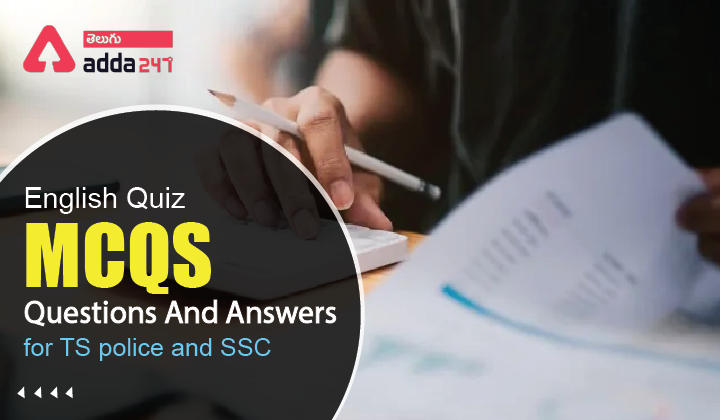English MCQs Questions And Answers: English is one of the most important scoring subjects for all TS And AP State level exams like APPSC Group 1,2,3, and 4 APPSC Endowment Officers etc. In this article we are providing English MCQs Questions and answers, these MCQs questions and answers will definitely helps in your success.
English MCQs Questions And Answers: ఆంధ్రప్రదేశ్ మరియు తెలంగాణ లో అత్యంత ముఖ్యమైన మరియు ప్రతిష్టాత్మకమైన పరీక్షలు పోలీస్ మరియు గ్రూప్-1,2,3 అలాగే UPSC లలోనికి చాలా మంది ఆశావహులు ఈ ప్రతిష్టాత్మక ఉద్యోగాల్లో కి ప్రవేశించడానికి ఆసక్తి చూపుతారు.దీనికి పోటీ ఎక్కువగా ఉండడం కారణంగా, అధిక వెయిటేజీ సంబంధిత సబ్జెక్టులను ఎంచుకుని స్మార్ట్ అధ్యయనంతో ఉద్యోగం పొందవచ్చు. ఈ పరీక్షలలో ముఖ్యమైన అంశాలు అయిన పౌర శాస్త్రం , చరిత్ర , భూగోళశాస్త్రం, ఆర్ధిక శాస్త్రం, సైన్సు మరియు విజ్ఞానం, సమకాలీన అంశాలు చాల ముఖ్యమైన పాత్ర పోషిస్తాయి. కాబట్టి Adda247, ఈ అంశాలకి సంబంధించిన కొన్ని ముఖ్యమైన ప్రశ్నలను మీకు అందిస్తుంది. ఈ పరీక్షలపై ఆసక్తి ఉన్న అభ్యర్థులు దిగువ ఉన్న ప్రశ్నలను పరిశీలించండి.
 APPSC/TSPSC Sure shot Selection Group
APPSC/TSPSC Sure shot Selection Group
English MCQs Questions And Answers
English-Questions
Directions (1-10): Select the option that will improve the segment in bold of the given sentence. In case no improvement is needed, select ‘No improvement.’
Q1. Vijay is wealthier of two brothers.
- Vijay is wealthy of two
- Vijay is wealthier of the two
- Vijay is the wealthier of two
- No Improvement
Q2. Rajesh is going to get a new furniture for the living room.
- new furnitures
- the new furniture
- No Improvement
- new furniture
Q3. Students may submit their expenses to Mr. Sharma or myself before Sunday.
- No Improvement
- to Mr. Sharma or me
- to Mr. Sharma or mine
- to Mr. Sharma or I
Q4. The Indian billionaire Mukesh Ambani owns much houses in all around the world.
- little houses
- more houses
- many houses
- No Improvement
Q5. They were on a trip unless Sunday.
- For
- No Improvement
- While
- Until
Q6. Mithila likes paint, singing and cooking.
- No Improvement
- painting, singing and cooking
- painting, sing and cooking
- painting, sing and cook
Q7. Santosh Sivan has been working as a cinematographer.
- Like
- If
- By
- No Improvement
Q8. Manish rarely stays at home on Sunday, doesn’t he?
- Does he?
- No Improvement
- Will he?
- Can he?
Q9. When people smoke cigarettes, it will damage their entire cardiovascular system.
- it would damage
- No Improvement
- it damages
- it may damage
Q10. One of the players have injured his hand while playing football.
- One of the player has
- One of the players has
- No Improvement
- One of players have
Solutions
S1. Ans.(b)
Sol. The correct answer is option b.
Replace ‘Vijay is wealthier of two’ with ‘Vijay is wealthier of the two’ to make the sentence grammatically and contextually correct.
When the comparative form is used to express selection from two of the same kind or class, it is followed by ‘of’ and preceded by ‘the’.
S2. Ans.(d)
Sol. The correct answer is option d.
Replace ‘a new furniture’ with ‘new furniture’ to make the sentence grammatically and contextually correct.
The common uncountable nouns include – accommodation, baggage, homework, knowledge, money, permission, research, traffic, travel.
These nouns are not used with ‘a/an’ OR ‘numbers’ and are not used in the plural.
S3. Ans.(b)
Sol. The correct answer is option b.
Replace ‘To Mr. Sharma or myself’ with ‘To Mr. Sharma or me’ to make the sentence grammatically and contextually correct.
The given sentence requires the object pronoun ‘Me’.
Use the pronoun ‘Me’ when the person speaking is receiving the action of the verb in some
way, either directly or indirectly.
For example – He was bullying me and my friend.
Use the pronoun ‘I’ when the person speaking is doing the action, either alone or with
someone else.
For example – I granted her leave.
Mine – It can only be used as a possessive pronoun. It comes after the noun.
For example – That dress is mine.
Myself – The reflexive pronoun ‘Myself’ is when the person speaking or writing is both the
subject of a sentence and its object. (It is called reflexive because it reflects the subject.)
For example – I managed to restrain myself. [direct object]
S4. Ans.(c)
Sol. The correct answer is option c.
Replace ‘much houses’ with ‘many houses’ to make the sentence grammatically and contextually correct.
Use ‘Much’ if the noun is uncountable (e.g., water, sand).
For example – I don’t have much money.
Use ‘Many’ if the noun is countable (e.g., oranges, children).
For example – I have many questions.
More – It is the comparative form of ‘Much and Many’. It indicates a greater amount or
number than that is indicated by ‘Much or Many.’
For example – You should sleep more than you do at the moment.
Little – It expresses a diminutive size or a negative quantity. Little means ‘Almost nothing’
or ‘Not much’.
For example – There was little time to finish my homework.
S5. Ans.(d)
Sol. The correct answer is option d.
Replace ‘Unless’ with ‘Until’ to make the sentence grammatically and contextually correct.
Until – It can be used as a preposition to mean up to. It is used to show the reference of time in a sentence for a certain task to be completed. It means up to a certain time limit.
For example – Shreya watched T.V. until 4 am.
Unless – It is used to show reference of a circumstance in a sentence for a certain task to be completed. It means up to a certain situation.
For example – No one can help you unless you tell us the problem.
For – It is used in time expressions to talk about the duration of an action.
For example – I have worked in this company for 11 years.
While – It is used to show that actions or events happen at the same time in the past, present or future.
For example – They were talking while the teacher was explaining the activity.
S6. Ans.(b)
Sol. The correct answer is option b.
Replace ‘paint, singing and cooking’ with ‘painting, singing and cooking’ to make the sentence grammatically and contextually correct.
Parallel structure means using the same pattern of words to show that two or more ideas have the same level of importance. This can happen at the word, phrase, or clause level. The usual way to join parallel structures is with the use of coordinating conjunctions such as ‘And’ or ‘Or.’
For example – The production manager was asked to write his report quickly, accurately, and thoroughly.
S7. Ans.(d)
Sol. The correct answer is option d.
The given sentence is grammatically and contextually correct.
The word ‘Like’ is used to mean ‘Similar to’ or ‘The same as’.
The word ‘As’ is used in sentences to highlight the job, appearance or function. It can also be used to mean ‘in the same way.’
As and like are prepositions or conjunctions. The prepositions as and like have different meanings. As + noun means ‘in the role of’, like + noun means ‘similar to’ or ‘in the same way as.
S8. Ans.(a)
Sol. The correct answer is option a.
Replace ‘Doesn’t he?’ with ‘Does he?’ to make the sentence grammatically and contextually correct.
The given sentence is based on ‘Question tag’. It is a statement followed by a mini-question. We use question tags to ask for confirmation.
If the statement is positive, the tag is usually negative and vice versa. The adverbs ‘Never, rarely, seldom, hardly, barely and scarcely’ have a negative connotation. Even though they may be in a positive statement, the feeling of the statement is negative. We treat statements with these words like negative statements, so the question tag is normally positive.
S9. Ans.(c)
Sol. The correct answer is option c.
Replace ‘it will damage’ with ‘it damages’ to make the sentence grammatically and contextually correct.
The given sentence is based on ‘Zero conditional’. We use the zero conditional to talk about permanent truths, such as scientific facts, and general habits.
Structure – If + present simple, … present simple.
For example – If you heat water to 100 degrees, it boils.
S10. Ans.(b)
Sol. The correct answer is option b.
Replace ‘One of the players have’ with ‘One of the players has’ to make the sentence grammatically and contextually correct.
One of the – It is a singular term and generally used to talk about a noun or a pronoun.
The noun or a pronoun used after the phrase “One of” is always in the plural form (as we refer to one person/place/thing out of many)
The helping verb will always be in the singular form, as the helping verb agrees with ‘One of’ and not with the plural noun in the sentence.
****************************************************************************
మరింత చదవండి:
| తాజా ఉద్యోగ ప్రకటనలు | ఇక్కడ క్లిక్ చేయండి |
| ఉచిత స్టడీ మెటీరియల్ (APPSC, TSPSC) | ఇక్కడ క్లిక్ చేయండి |
| ఉచిత మాక్ టెస్టులు | ఇక్కడ క్లిక్ చేయండి |





